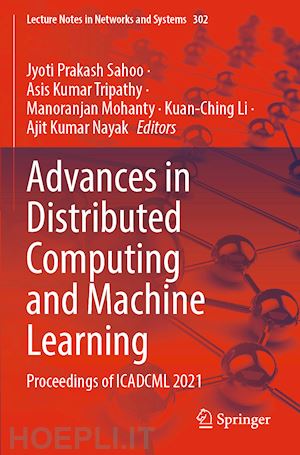

Questo prodotto usufruisce delle SPEDIZIONI GRATIS
selezionando l'opzione Corriere Veloce in fase di ordine.
Pagabile anche con Carta della cultura giovani e del merito, 18App Bonus Cultura e Carta del Docente
This book presents recent advances in the field of scalable distributed computing including state-of-the-art research in the field of Cloud Computing, the Internet of Things (IoT), and Blockchain in distributed environments along with applications and findings in broad areas including Data Analytics, AI, and Machine Learning to address complex real-world problems. It features selected high-quality research papers from the 2nd International Conference on Advances in Distributed Computing and Machine Learning (ICADCML 2021), organized by the Department of Computer Science and Information Technology, Institute of Technical Education and Research(ITER), Siksha 'O' Anusandhan (Deemed to be University), Bhubaneswar, India.
Jyoti Prakash Sahoo is a Senior Member, IEEE, and an experienced Assistant Professor with a demonstrated history of working in engineering education. Currently, he is working in the Dept of Computer Science and Information Technology, Institute of Technical Education and Research, Siksha ’O’ Anusandhan (Deemed to be University) for the last 10 years. Prior to joining Siksha ’O’ Anusandhan, he also worked as an Assistant Professor with CV Raman College of Engineering, Bhubaneswar(now C. V. Raman Global University). He is having more than 12 years of academic and research experience in Computer Science and Engineering. He has published several research papers in various international journals and conferences. He is also serving many journals and conferences as an editorial or reviewer board member. He is having expertise in the field of Cloud computing and Machine learning. He served as Publicity chair, Web Chair, Organizing secretary, and Organizing member of technical program committees for many national and international conferences. Being a WIPRO Certified Faculty, he has also contributed to industry-academia collaboration, student enablement, and pedagogical learning. Furthermore, he is associated with various educational and research societies like IET, IACSIT, IAENG, etc.
Asis Kumar Tripathy is an Associate Professor in the School of Information Technology and Engineering, Vellore Institute of Technology, Vellore, India. He has more than ten years of teaching experience. He completed his Ph.D. from the National Institute of Technology, Rourkela, India, in 2016. His areas of research interests include wireless sensor networks, cloud computing, the Internet of things, and advanced network technologies. He has several publications in refereed journals, reputed conferences, and book chapters to his credit. He has served as a program committee member in several conferences of repute. He has also been involved in many professional and editorial activities. He is a senior member of IEEE and a member of ACM.
Manoranjan Mohanty is a lecturer in the Center for Forensic Science at the School of Mathematical and Physical Science, University of Technology Sydney (UTS), Australia. He comes from Computer Science background. His research interest is on digital forensics and cybersecurity, with current focus mainly on source camera attribution, child explicit content detection, fake food detection, privacy-aware forensics, cloud and IoT forensics, and application of deep learning and blockchain for forensics. Manoranjan received his Ph.D. in Computer Science from the National University of Singapore, Singapore in 2014. After that, he spent a year as an ERCIM Alain Bensoussan research fellow at SICS Swedish ICT, Sweden, and two years as a research fellow at New York University. Before joining UTS, he was a Lecturer in Digital Security at the University of Auckland, New Zealand. He has worked as a TPC member and a reviewer of a number of journals and conferences, including the IEEE Transactions on Information Forensics and Security, ACM Transactions on Multimedia Computing, Communications, and Applications, ETRI Journal, and the IEEE ICME.
Kuan-Ching Li is currently appointed as Distinguished Professor at Providence University, Taiwan. He is a recipient of awards and funding support from several agencies and high-tech companies, as also received distinguished chair professorships from universities in several countries. He has been actively involved in many major conferences and workshops in program/general/steering conference chairman positions and as a program committee member, and has organized numerous conferences related to high-performance computing and computational science and engineering. Professor Li is the Editor-in-Chief of technical publications Connection Science (Taylor & Francis), International Journal of Computational Science and Engineering (Inderscience) and International Journal of Embedded Systems (Inderscience), and serves as associate editor, editorial board member and guest editor for several leading journals. Besides publication of journal and conference papers, he is the co-author/co-editor of several technical professional books published by CRC Press, Springer, McGraw-Hill, and IGI Global. His topics of interest include parallel and distributed computing, Big Data, and emerging technologies. He is a Member of the AAAS, a Senior Member of the IEEE, and a Fellow of the IET.
Ajit Kumar Nayak is professor and head of the Department of Computer Science and Information Technology in the Institute of Technical Education and Research at Siksha ’O’ Anusandhan University, Bhubaneswar. He earned his M. Tech. and Ph.D. in computer science at Utkal University in 2001 and 2010, respectively. He has published more than 70 research articles in conference proceedings and journals. He is a member of the IEEE











Il sito utilizza cookie ed altri strumenti di tracciamento che raccolgono informazioni dal dispositivo dell’utente. Oltre ai cookie tecnici ed analitici aggregati, strettamente necessari per il funzionamento di questo sito web, previo consenso dell’utente possono essere installati cookie di profilazione e marketing e cookie dei social media. Cliccando su “Accetto tutti i cookie” saranno attivate tutte le categorie di cookie. Per accettare solo deterninate categorie di cookie, cliccare invece su “Impostazioni cookie”. Chiudendo il banner o continuando a navigare saranno installati solo cookie tecnici. Per maggiori dettagli, consultare la Cookie Policy.